Last Updated on March 13, 2022 by Heather Hart, ACSM EP, CSCS
For as much time as I spend defending this sport against all of the “running is bad for your knees” naysayers, I will be the first to admit that running can, and often does, hurt a little bit.
Running long distances, especially when you are new to them, can leave you hobbling around for a few hours post run, desperately seeking some sort of relief from the discomfort of sore muscles.
However, the plethora of information (and misinformation, let’s be real)about how to properly recover can be just as overwhelming as the information about how to properly train.
Every dedicated runner has their preferred recovery trick, whether there is any proven benefit to that trick or not. Compression socks. Foam rolling. Ice baths. And the one I want to talk about today: Epsom Salt baths for post run soreness.
Poll a group of endurance athletes on what they do for post long run soreness, and I guarantee that multiple people will answer “Epsom salt bath!” The claim is that by soaking in a bath with Epsom salts, otherwise known as magnesium sulfate, will help prevent and heal muscle soreness, joint pain, and detoxify the body.
Let’s dig deeper into how this might, in theory, work.
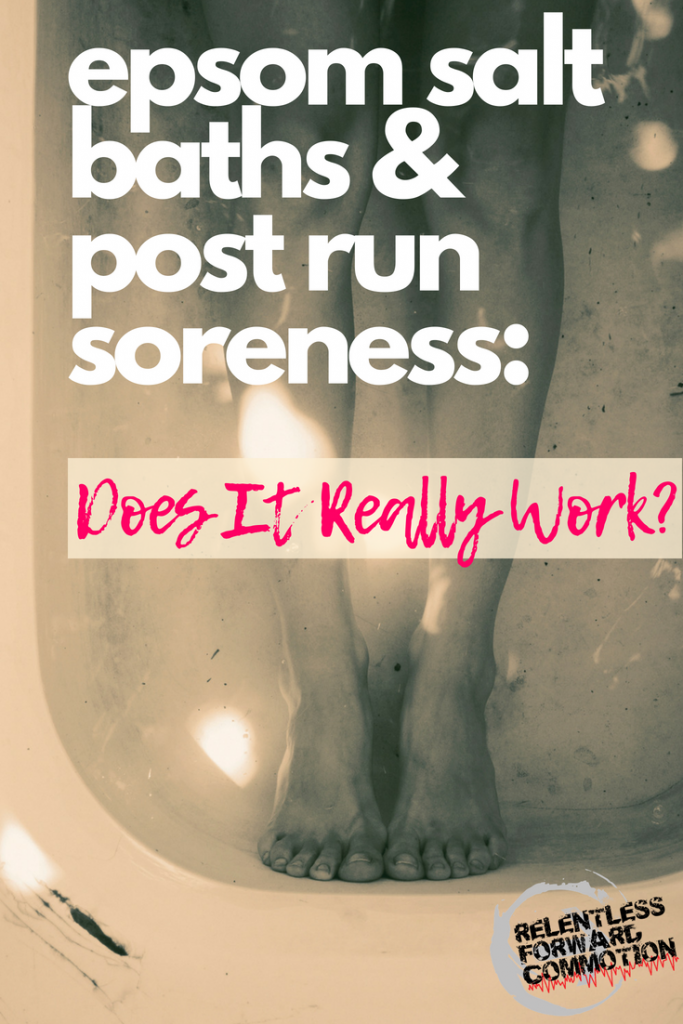
What is Epsom Salt?
Epsom salt, also known as magnesium sulfate, is a chemical compound made up of magnesium, sulfur, and oxygen.
Fun fact: it’s called “Epsom” salt because it was first discovered in the town of Epsom in Surrey, England.
Why Do People Recommend Epsom Salt for Runners?
The belief among the running and athletic community is that the purpose of an Epsom salt bath after a workout or race can help alleviate soreness, tight muscles, or muscle aches.
But if you ask a runner why these baths supposedly work, chances are most aren’t exactly sure.
You may hear claims of benefits of Epsom salt soaks “removing lactic acid” (a false claim, as the body naturally processes lactate soon after exercise ends, and lactate isn’t responsible for muscle soreness). You may hear that Epsom salts have anti-inflammatory properties
Ultimately, all of these supposed benefits boil down to the concept that soaking in Epsom salts – magnesium sulfates -will help replace magnesium “lost” during exercise.
Magnesium and Running:
Magnesium is a critically important mineral found in the human body, and is heavily involved in protein synthesis, energy production and detoxification.

Runners in particular are at a risk for magnesium deficiency, as research has shown that exercise not only induces a redistribution of magnesium in the body to accommodate metabolic needs, but exercise also increases urinary and sweat losses that may increase magnesium requirements by 10-20% (source).
Does a Magnesium Deficiency Cause Cramps in Runners?
Fatigue, muscle spasms , twitches, and muscle cramps are among the symptoms of magnesium deficiency.
Therefore, the claims are that by soaking in a tub full of Epsom salt, magnesium and sulfate are absorbed through your skin, make up for those deficiencies, and magically aide the protein synthesis and detoxification of your body, resulting in less soreness.
Makes sense, right? Well it could…except that the human body doesn’t exactly work that way.
Do Epsom Salt Baths Work in Replacing Magnesium?
Epsom salt baths are not an effective way at replacing lost magnesium for runners, athletes, or anyone with sore muscles. And here’s why:
Our skin is relatively waterproof, a design that by nature helps us keep all of the “good” stuff inside our bodies, and the “bad” stuff out . If our skin wasn’t essentially non-permeable, we’d be constantly struggling to keep out toxins and keep in everything else we need in order to survive.
Therefore, the idea that a quick soak in a tub can both cause minerals we are supposedly deficient in to soak into our body, all while the bad “toxins” soak out, seems a little far fetched.
Is an Epsom Salt Bath an Old Wives Tale?
While we’ve always heard that Epsom salt baths may alleviate post run soreness, it may just be an old wives tale without any scientific proof.
In fact, a quick Google search, or even an extensive pubmed.gov search for that matter, will turn up empty with reputable, peer reviewed research that says magnesium and sulfate are absorbed across the skin, or that Epsom salt baths actually work as a means of post workout recovery.
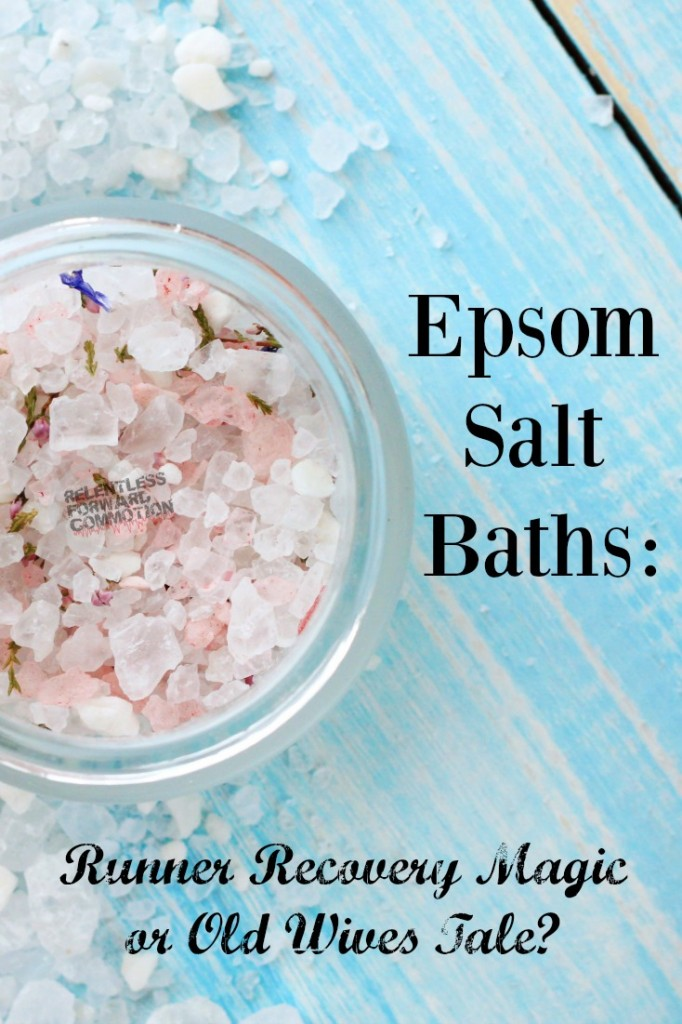
In other words, there is currently no scientific support for the claims of Epsom salts when it comes to sore joints and muscles, nor the claims that transdermal magnesium absorption (i.e. sitting in a bathtub full of magnesium sulfate) is a successful way to increase magnesium levels in the body.
So is an Epsom salt bath soak a complete waste of time?
Not necessarily.
Possible Benefits of an Epsom Salt Bath After Running:
Despite the inability to replace magnesium, there may still be some benefits to a warm Epsom salt bath after a hard workout or big race.
Promote Recovery of Damaged Tissue
Hot water will increase blood flow to your muscles via vasodilation. Post-run baths can increase blood flow, which will bring more oxygen to your muscles, while simultaneously helping to remove waste product from muscle tissue damage.
In short? A hot water soak may help promote muscle recovery. However it’s important to know that the addition of Epsom salts to the bath water will not increase nor decrease this effect.
Coach’s note: a bath, not or cold, will not magically heal acute injuries or chronic athletic injuries. If you are injured, please see a physical therapist or your physician.
Relaxation
There is no denying that a nice, hot bath can help relax you, both mentally and physically.
This of course, is the complete opposite concept of the post long run ice bath, which I would argue is not relaxing AT ALL.
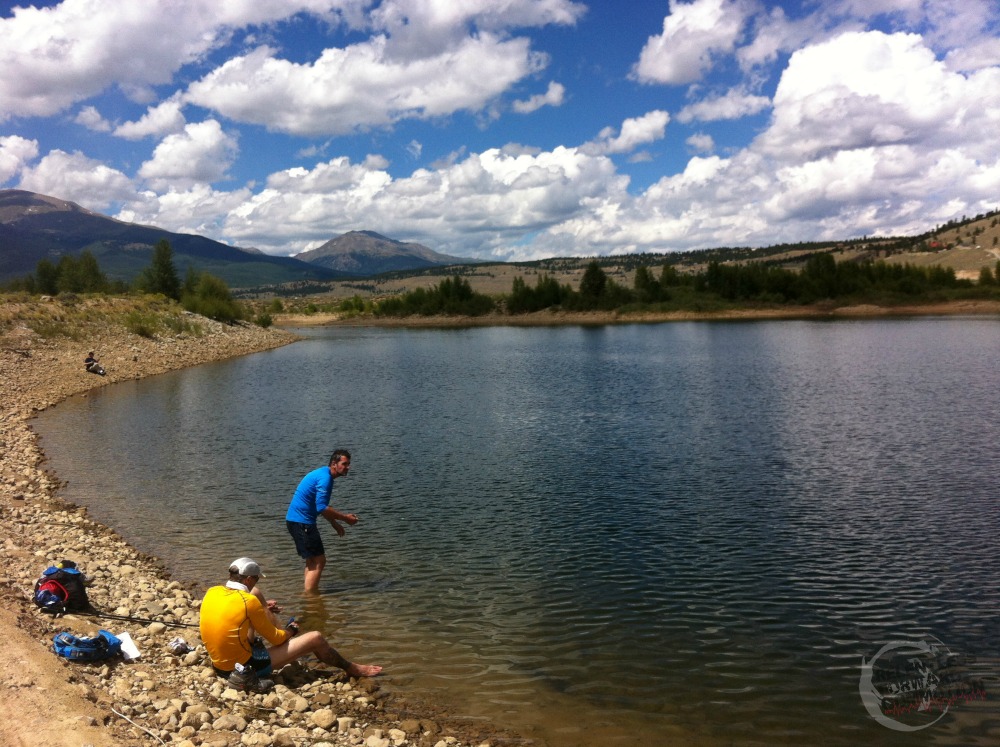
Further the purported benefits of ice baths are perhaps not what we once believed. One research study shows that cold water immersion is no more effective than active recovery (which is probably far more enjoyable).
But let’s get back to the hot bath.
Adding essential oils or aromatherapy Epsom bath salts to your bath an help you mentally unwind from the stressors of training, and life in general.
Relaxing your mind may help you relax your muscles, which can help soothe stress, aches, and pains associated with hard training. And some research even shows that warm muscles are likely to be less tense than cold muscles.
Placebo Effect
Lastly, there is always the argument of the placebo effect. If you feel better after soaking in a hot tub full of Epsom salt, then do it.
There is likely little to no risk in a relaxing bath full of Epsom salts.
Improvement in Skin Issues
Because Epsom salts have a drying effect on the skin, they may help with skin conditions such as athlete’s foot or toenail fungus.
It should also be noted that because of this drying effect, some Espsom salt products may cause skin irritations in those with sensitive skin.
How Can Runners Replace Magnesium?
To bring this full circle, while we know runners are at risk for magnesium deficiency, and we know these salty soaks aren’t going to help the issue, how can runners replace magnesium? Through food and supplements.
Magnesium Dosage for Runners
The Recommended Dietary Allowance (RDA) for healthy adults aged19-51+ years is 400-420 mg daily for men and 310-320 mg for women (source).
But research suggests that runners and endurance athletes can safely consume 500-800 mg of magnesium a day, and there is debate as to whether even that amount is enough. So where do you get it from?
Magnesium Replacement Sources for Runners:
Magnesium is found naturally in a number of healthy foods, such as spinach, pumpkin seeds, brown rice, avocados, dark chocolate, and so much more.
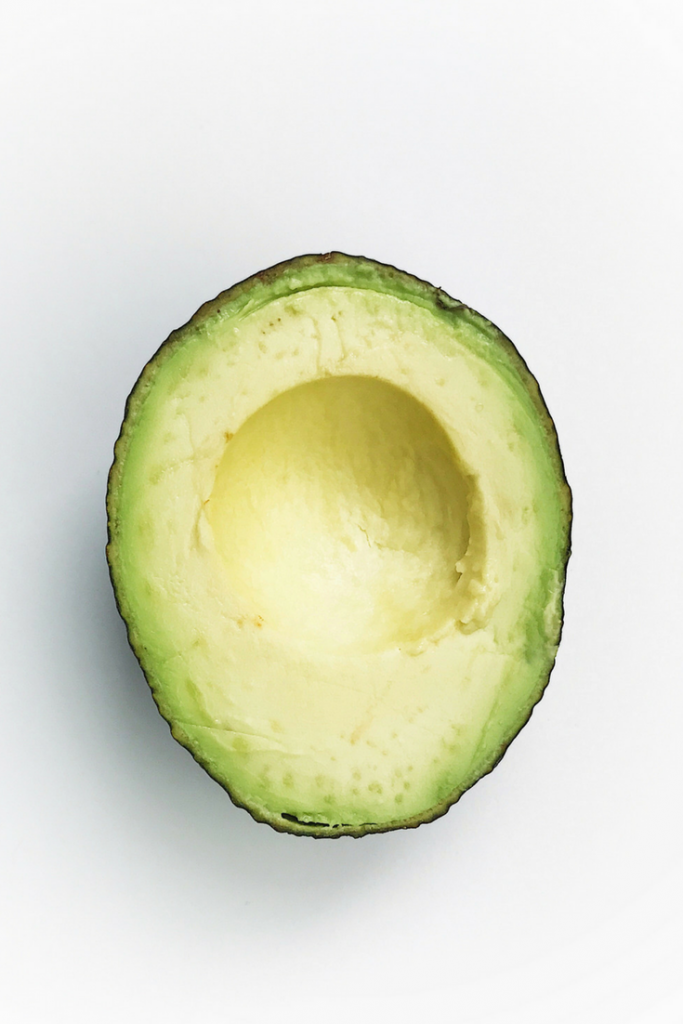
Another option, that should be used in addition to, and not in place of, food based magnesium sources is a magnesium supplement. An example of a sports specific magnesium supplement includes ZMA Sports Recovery from NOW Sports (disclaimer: that’s an amazon affiliate link), which is a supplement that combines Zinc, Magnesium, & Vitamin B-6.
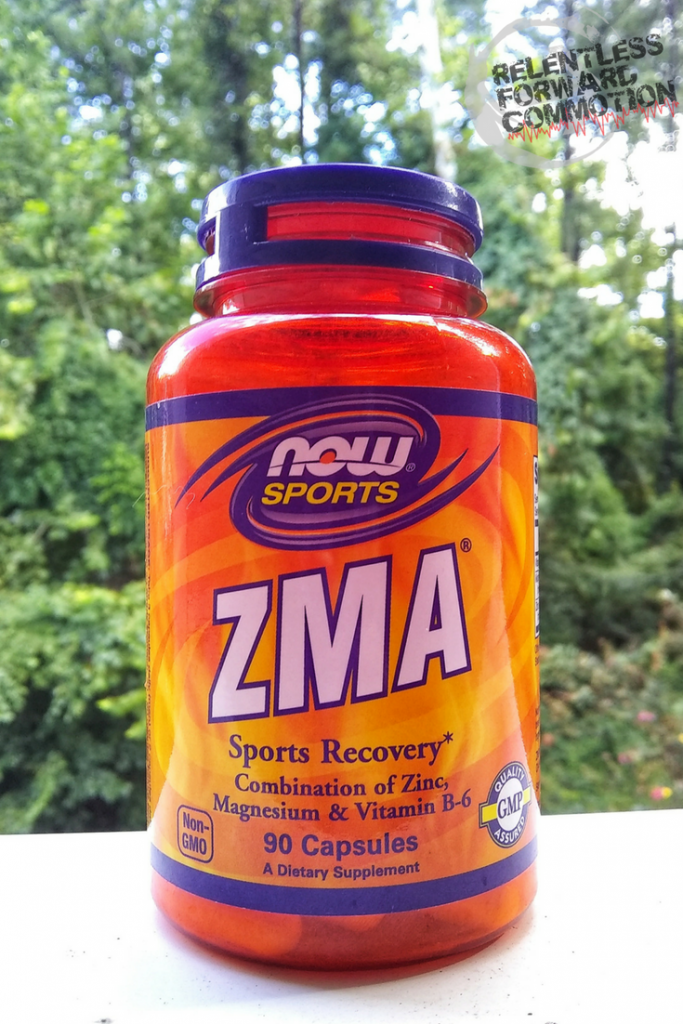
There are a number of other magnesium supplements available on the market. If you choose to take a supplement, ALWAYS consult your physician first to ensure that the supplement is right for you, and to discuss proper dosing for your needs.
And also be warned – magnesium supplements can have a laxative effect . Start slowly…you’ll thank me later.
Are Epsom Salt Baths Good for Runners?
At this time, science has yet to provide concrete evidence proving that we can fix this deficiency, nor alleviate sore muscles, from simply soaking in Epsom salts in a bathtub.
I’m sorry to break it to all of you devout fans, but it appears use of Epsom salts for healing sore muscles is likely an old wives tale, and you are experiencing a placebo effect.
But all of that said: will an Epsom salt bath hurt you? Chances are no, not at all. If anything, it will help you relax…and your long run legs deserve the break! So soak in that tub, my friends! You’ve earned it!
Heather Hart is an ACSM certified Exercise Physiologist, NSCA Certified Strength and Conditioning Specialist (CSCS), UESCA certified Ultrarunning Coach, RRCA certified Running Coach, co-founder of Hart Strength and Endurance Coaching, and creator of this site, Relentless Forward Commotion. She is a mom of two teen boys, and has been running and racing distances of 5K to 100+ miles for over a decade. Heather has been writing and encouraging others to find a love for fitness and movement since 2009.

Cory McNair
Great article! A warm, relaxing bath (epsom salts or not) will always be better than an ice bath. More recent research has shown that ice baths do not seem to work, or at least not to the extent to deal with discomfort. Cold/Warm alternating baths seem to show slightly more promise, but still, it goes to how much discomfort are you willing to take for a very small amount of benefit.
In regards to why it doesn’t work, you have to look at the fact that cold inhibits blood flow at a time when your muscles need lots of blood flow to bring in and carry out materials to heal. We have demonized the word inflammation to the point that we forget why the body responds in this manner––to heal.
So the epsom salts themselves may not be doing anything under the skin, but the warmth of the bath may actually help more than a freezing torture chamber. That, and your skin will come out luxuriously silky.
Virjinia
Thanks for sharing this. Sometimes, I do wonder whether those baths help and if ice baths are really worth it too. It’s interesting to see the science behind it but I do agree. Even a nice bath every once in a while to relax is good for our bodies!
Dave
Thanks for the information. Hot bath in the cold months and cold shower in the hot months has always been my routine and it still feels sooooo good!